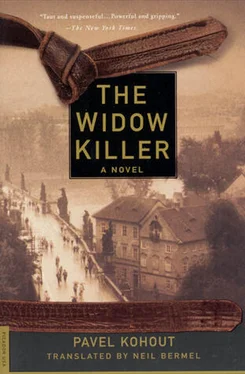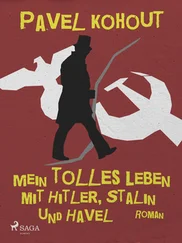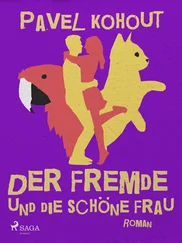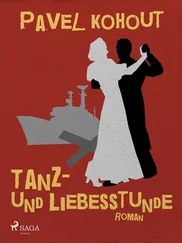“So Papa’s home,” he said joyfully, swinging her around in the air.
“Grandpa, you mean,” she corrected him.
“How’s that?”
“You’ll be the papa now,” she said, slipping into their south Moravian dialect. “Watch out or you’ll shake the baby right out of me, lover boy!”
Jana Kavanová walked home from the funeral smiling. Beneath her black stockings and black ankle boots the bright green grass struggled up between the cobblestones; runners of woodbine wound about the fortress ramparts, their leaves slowly unfolding, and the sky over the moat of the street was amethyst blue and free of airplanes, as it had been for weeks. A feeling of complete happiness suffused her, so strong that she felt ashamed.
Her older sister had just buried her beloved husband. Jana had left her up at the graveside and hurried home to the embrace of her young lover. She could — and would — comfort her sister tomorrow, the day after, and all the days to come, but she would only have Robert today. Prague was swarming with Gestapo agents; it was too risky for him to stay. She had made the arrangements; tomorrow he would be taken on borrowed documents to a place where he could wait out the end of the war safely.
Jana, almost thirty, had met Robert two months before in the shelter beneath Prague’s main rail station. A tall fellow in a clearance-troops overcoat, he gallantly offered her the rare gift of a cigarette. His voice was deep, and in the emergency lighting he looked like her contemporary. She had already accepted his invitation to meet that evening when she learned that he was a newly deployed seventh-year gymnasium student. She kept her word, however, and had not regretted it.
He ended up at her place that evening. The majority of pubs and cafes were closed and the rest seemed hollow and empty: either there were no menus for the customers, or no food for the cooks, or no appetite for the food. Back at the statue of Saint Wenceslas, still the meeting place for young Prague — and God knows Jana didn’t feel old! — she boldly invited him to her apartment for tea with real rum. She could always send him home to his mother, she rationalized to herself. However, as it turned out, he was no child; she warmed to him more and more, and when they had finished the rum (without any tea), she was happy for him to stay.
I’m certainly not his first, she thought jealously, when she saw how skillful he was. Still, she had not slept with anyone for a good six months, since her most recent disastrous fling, and this kid was only a temporary distraction, anyway. Eventually she would find the right man, maybe after the war when the better-quality ones came home from the army. So she gave herself to him without a second thought.
Apparently he took to her as well. He confessed that he’d never been with such a… mature woman. He chose the word carefully and it stung her, but at the same time she felt appreciated. After that he came to see her every night and painted a humorous picture for her of his aunt and guardian’s mounting disapproval. Then, in mid-March, he had learned that in two days his whole class was leaving for northern Moravia.
The Protectorate’s eighth-year gymnasium students had long since been deployed at hard labor around the Reich; the seventh-years were now assigned to build the defensive line against the anticipated Russian offensive. Gangs of eighteen-year-olds were to do the excavating under the supervision of German guards. Families of deserters would be threatened with punitive measures. Robert therefore went.
As they agreed, she tagged along that morning, twenty yards behind him — too young to hug him like the other mothers, too old to join the girls accompanying their boyfriends. The truck with its benches trundled off and dissolved in her tears. She knew then that this was not just a passing fling; Robert had truly become her lover.
For a month she heard nothing from him. Her initial despair gradually abated as she stubbornly pieced together information from every possible source. Finally she could not bear the burden of her love alone, and confided in her sister. It surprised and comforted her when her sister emphatically told Jana not to worry about the age difference; she was happy just to see Jana happy.
Leaving early today had been her sister’s idea. Her older sibling had fallen in love with and married a man twice her age, knowing she would soon be more of a nurse than a wife. But she loved him even then and cared for him for many years. Four days ago he simply did not wake up. Only then did Jana hear her sister wail that her life had lost all meaning.
Despite this, her sister ordered her to go straight home from the funeral. She was the only one who knew that Robert was momentarily hiding at Jana’s. As the Soviet cannonade swept across the northeast past Ostrava, the Nazis’ deviousness grew worse and worse; there were fearful rumors that in their desperation the Germans were planning to send the Czech students out in front of the tanks as human shields. His classmates were afraid to flee, so Robert risked it alone.
Two days’ hard march brought him to Olomouc. Even hitchhiking, he’d seen his luck hold; a truck driver put him in a sick deliveryman’s seat, and took him all the way to Prague. Their first night together he and Jana made love until morning. The following day she visited Robert’s aunt. The woman was overjoyed to hear the news, and promised to arrange safe transfer and shelter for her nephew until the end of the war.
So this would be their last night together for who knew how long, and Jana was grateful that her sister had not asked her to give up a minute of their limited time. At the graveside, she thought fondly of her dear brother-in-law, cast a handful of dirt on the coffin, gave her sister a heartfelt kiss, and set off toward the tram. Death was instantly forgotten, and Jana was filled with that joyful longing that had been with her for three days, ever since she let Robert in and he knelt, exhausted, on the threshold and pressed his head into her lap.
The tram conductor asked if she had a ticket, and Jana returned abruptly from her thoughts of Robert to the outside world. As she paid she noticed a postman with a bulging bag. Why did he seem so familiar? The fog began to clear from her brain. Hadn’t he passed her on the way from the cemetery? But if he’d been going uphill, how did he end up here?
She put him out of her mind and spent the rest of the trip to Smíchov laying her plans. Of course, Robert couldn’t come to Prague from the country, but why shouldn’t she visit him on Sundays? The trains still ran, albeit with delays, despite the air raids. She wasn’t afraid of them anyway; love was her armor.
As she quietly unlocked the door, her heart was in her throat. She crossed the entrance hall on tiptoes and silently opened the bedroom door. Robert lay naked on the bed, breathing deeply. Yes, he was a man, but in sleep his boyishness showed through. She gazed at him, lost in adoration, and in that moment believed that despite the difference in their ages, nothing could separate them.
The doorbell made her jump. Who could it be? The police? Or maybe the Gestapo? Impossible, she snapped at herself; no one had any idea he was here, aside from his aunt and her sister, and they would never betray him. Feeling more confident, she returned to the apartment door and boldly asked, “Who’s there?”
“Special delivery,” the answer came back.
She remembered the man in the blue cape, swollen by the fat bag underneath it, and had to laugh: she and her postman had taken the same tram here. Or would it be a different carrier? Probably! She opened the door.
It was him.
They still kept to their unspoken agreement: the terrors and horrors of their work would not cross the door of their tiny and uncertain refuge. The need for peace and quiet ran deep in their blood.
Читать дальше












